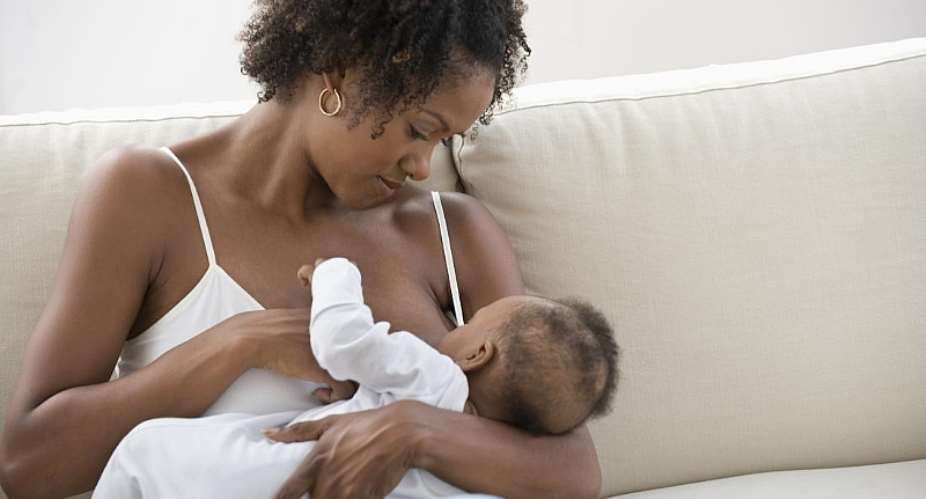The percentage at which children less than six months are being breastfed exclusively is gradually increasing, with the country recording 52 percent of children who are exclusively breastfed.
This shows an increase from the 46.3 percent recorded a few years ago which represented a significant drop from the country's earlier achievement of 68 percent of exclusive breastfeeding coverage in 2012.
This achievement has come about as a result of interventions introduced by the Ghana Health Service (GHS) and the Ministry of Health (MoH), including the intensification of the breastfeeding promotion regulation.
Globally, breastfeeding rate rates have remained stagnant for two decades, with less than 40 percent of children less than six months being exclusively breastfed.
Eunice Sackey, National Breastfeeding Programmes Coordinator, Ghana Health Service (GHS), speaking at the media briefing on the national launch of the breastfeeding week in Accra, said the importance of breastfeeding cannot be over emphasized as it is the foundation for good health for all children both in the short and long term and also benefits mothers.
“New evidence presented in the Lancet (UK Medical journal) confirms that optimal breastfeeding could save 823,000 child lives and add $302 billion to the global economy annually,” she said.
Linking the weeklong celebration themed: 'Breastfeeding: A Key to Sustainable Development To The Sustainable Development Goals (SDG)', Mrs Sackey stated that breastfeeding plays significant role in the attainment of all the goals.
“In nutrition, food security and poverty reduction as breast milk is an affordable form of nutrition and as such an important way of reducing the effect of poverty,” she said.
She, however, added that challenges such as poor support from male partners and lack of information from healthcare providers, aggressive marketing of breast milk substitutes, among others, should be addressed through proactive means to provide support that would help mothers breastfeed optimally.
Dr Victor Ngongalah, Chief Health & Nutrition, UNICEF, in his remarks said the country can get its former breastfeeding rate up again if men support their wives and government agencies to enforce laws on breast milk substitute.
Dr Cynthia Bannerman, chairperson for the event, also encouraged corporate organisations to create the environment for their female employees to breastfeed their children through establishing nurseries where they can go to express milk for their babies.
“Fifty-two percent is still low so let put our efforts together because there is more we can do to improve exclusive breastfeeding in Ghana,” she mentioned.
By Jamila Akweley Okertchiri





 'Ghana beyond aid' has turned out to be 'Ghana without compass' – Naana Opoku-Ag...
'Ghana beyond aid' has turned out to be 'Ghana without compass' – Naana Opoku-Ag...
 Nation builder Mahama will deliver on his promise of a 24-hour economy for the b...
Nation builder Mahama will deliver on his promise of a 24-hour economy for the b...
 Prof Jane Naana is more than qualified to be Ghana’s first vice president and ev...
Prof Jane Naana is more than qualified to be Ghana’s first vice president and ev...
 WENDA petitions Akufo-Addo, Speaker of Parliament to make vote-buying illegal
WENDA petitions Akufo-Addo, Speaker of Parliament to make vote-buying illegal
 Supreme court declares payment of wages to spouses of President, Vice President ...
Supreme court declares payment of wages to spouses of President, Vice President ...
 Publish full KPMG report on SML-GRA contract – Bright Simons to Akufo-Addo
Publish full KPMG report on SML-GRA contract – Bright Simons to Akufo-Addo
 Kumasi International Airport to begin full operations by end of June
Kumasi International Airport to begin full operations by end of June
 Election 2024: Our ‘real challenge’ is getting ‘un-bothered’ youth to vote – Abu...
Election 2024: Our ‘real challenge’ is getting ‘un-bothered’ youth to vote – Abu...
 [Full text] Findings and recommendations by KPMG on SML-GRA contract
[Full text] Findings and recommendations by KPMG on SML-GRA contract
 Renegotiate SML contract – Akufo-Addo to GRA, Finance Ministry
Renegotiate SML contract – Akufo-Addo to GRA, Finance Ministry
